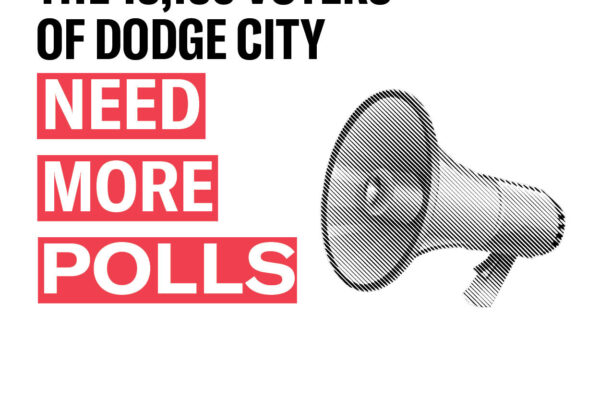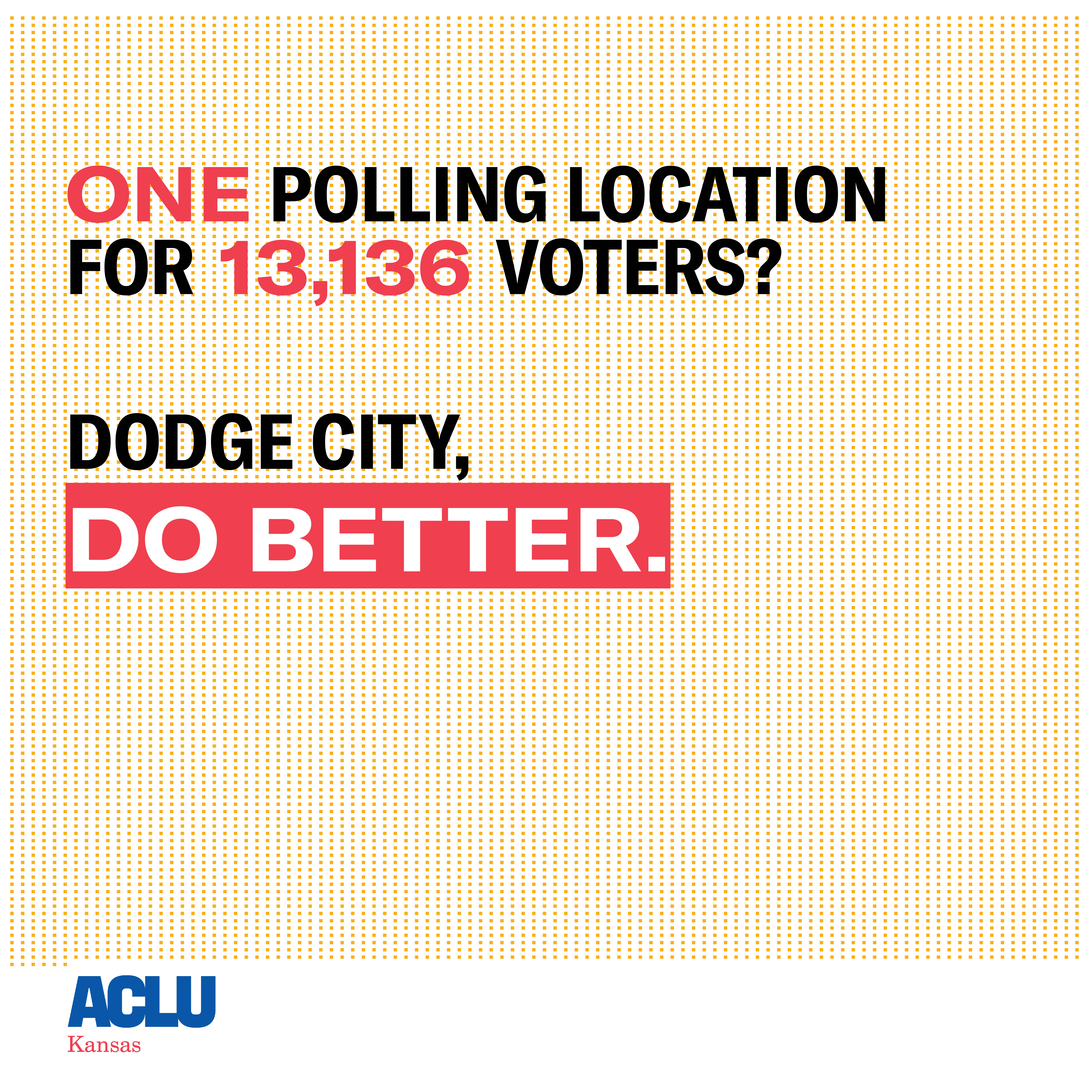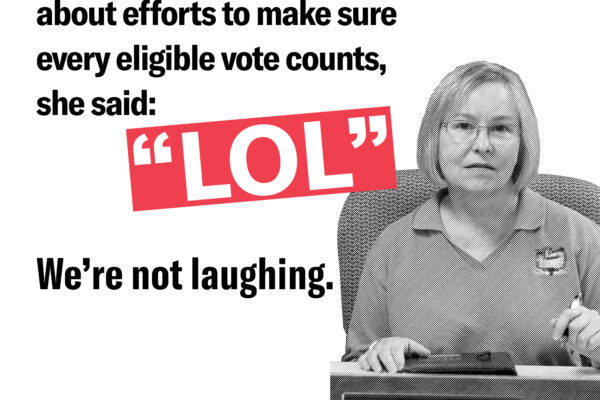By Jonathan Shorman, The Wichita Eagle
DODGE CITY, KS — After the ACLU objected to Dodge City’s single, out-of-town polling place, the local official in charge of elections forwarded to the state an ACLU letter asking her to publicize a voter help line.
“LOL,” she wrote in an email to Kansas Secretary of State Kris Kobach’s office.
As Election Day approaches, concerns are being raised in Kansas over voting rights and access to the polls. The movement and elimination of some polling places is sparking fears that casting a ballot may be more difficult for some this year.
Nowhere are worries greater than in Dodge City, where residents must leave town if they want to vote on Election Day.
The city has drawn national scrutiny over voting rights since Ford County Clerk Debbie Cox — citing construction — moved its only polling location to a building south of the city limits. The site can’t be reached by sidewalks and is separated from much of the city by train tracks. Sixty percent of the town’s residents are Hispanic.
“I don’t hate Debbie Cox. I don’t want anything against her. I just want her to do her job properly” and promote voter turnout, said Alejandro Rangel, who plans to cast the first ballot of his life on Nov. 6 after turning 18 on Oct. 29.
Cox said she moved the polling location out of a concern for safety. And she said she didn’t mean anything when she wrote “LOL.”
“This was not done with any racial intention at all,” Cox said during an interview in her office on Gunsmoke Street downtown.
Interviews with Dodge City residents, local officials and activists show a city divided over the polling site move. Some dismiss the controversy as overblown and driven by outsiders, while others say the situation points to real problems with voter access.
But Dodge City isn’t the only controversy to jolt the state’s election system this year.
In Wyandotte County, officials face criticism for having five precincts in Argentine — a neighborhood in Kansas City, Kan. with a large Hispanic population — vote at a building that includes a police station.
And in Barton County in western Kansas, the county clerk is cutting the number of polling places, citing costs. The decision has produced some complaints.
Kansas has lost more than 100 polling places over the past few years, even as the number of registered voters has risen by more than 46,000.
One study released this fall by researchers at Northern Illinois University ranked Kansas the 9th hardest state to vote in. A review by MIT gave Kansas a low ranking among states when it comes to election system performance.
Kobach — the state’s top election official — defeated Gov. Jeff Colyer by fewer than 350 votes in the August Republican primary for governor. It took days to determine the winner and revealed an election system where officials in some parts of the state counted provisional ballots that were tossed elsewhere. Provisional ballots are cast when a voter’s eligibility is in question — for example, if they didn’t bring an ID or are at the wrong polling place.
Democratic leaders are calling on Kobach and one of his longtime deputies to recuse themselves from oversight of the Nov. 6 general election.
But Kobach spokeswoman Danedri Herbert said the secretary of state has a constitutional responsibility to to oversee all elections in the state, including his or her own.
Kobach doesn’t control the election decisions in most Kansas counties, Herbert said, though he controls the number and location of polling sites in the four largest counties, including Johnson and Sedgwick. “That’s why you see such a good distribution of polling places in those four counties,” she said.
Elections are overseen by clerks in the vast majority of counties. That includes Ford County, where Dodge City — with a single polling place for 13,000 registered voters — is located.
Rick Hasen, an election law expert at the University of California, Irvine School of Law, said he had “never heard of a single polling place for so many people, and located so far away from those people and away from public transportation.”
“It’s outrageous,” he said.
‘LOL’
Dodge City, famous in Western lore, has about 27,000 residents. The meatpacking industry employs thousands of people. The minority population has been growing for years, making Dodge City one of the few in Kansas where a majority of residents are not white.
The city has used just one polling site since at least the mid-’90s. Although some Democrats and local activists have spoken of a need for more polling places, other residents said the city’s single location at the Civic Center in a predominantly white area in the northern end of the city hadn’t been controversial.
That began to change in August.
The Dodge City school district, which controls the center, plans to begin construction this fall on an expansion that will eventually house its administrative offices. During construction, the number of standard parking spots will fall from 519 to 450. Work was initially projected to begin in October, but a reporter who visited this week saw little sign of activity.
On Sept. 11, Cox told Bill Hammond, the district’s director of business and operations, in an email that she had decided to move the city’s polling place to the Western State Bank Expo Center half a mile south of the city’s southernmost edge. The email was one of several obtained by The Eagle through a records request.
Cox wrote that she had driven around the Civic Center “and I just feel that for this November Election to make it safe for the voters and all that” that she was moving the polling site.
Hammond said he had informed Cox that a nearby church could be used for parking. Hammond, who had been a Republican for 45 years but became a Democrat earlier this year, said the city needs more polling places.
Cox emphasized her decision had been driven by concern for voter safety.
“If it was going to be storming and icy, they would have to walk through that and through the construction,” Cox said.
By contrast, vehicles can come right up to the entrance at the Expo Center, she said.
Much of Dodge City’s Hispanic population is concentrated in the southern part of the city, and for a few residents the Expo Center may actually be closer than the old polling site.
But there is no bus route, or sidewalk, to the location. To get there on foot from town, you must cross a state highway.
In multiple letters to Cox, the American Civil Liberties Union of Kansas has raised concerns about the polling location and urged her to expand the number of sites after the election.
Cox, a Republican, did not respond to the ACLU’s letters about the polling site, but they have caught the county’s attention.
The county commission held two closed-door sessions on Monday with Cox, citing “the voting rights act.” Between sessions, a reporter could see a letter with the ACLU logo on a table where Cox and the county’s attorney were sitting. Cox said later she was informing commissioners about the polling situation.
A few hours earlier that day, Cox had forwarded to the Kansas secretary of state’s office another letter she received from the ACLU describing its statewide “election protection” efforts and asking her to publicize a hotline voters can call if they need assistance.
“This is what I got today in the mail from ACLU. LOL,” Cox wrote in a message she sent to Bryan Caskey, state director of elections.
Cox said she didn’t mean anything by the “LOL.”
“It’s just kind of like, ‘OK, here we go again,’” Cox said.
Caskey told The Eagle that the secretary of state’s office does not offer guidance to clerks about where to have polling locations or how many to have. State law places that responsibility with the clerks, he said.
Clerks are in the best position to find locations that are accessible and have enough parking, he said.
“In addition, each polling location carries with it the cost of renting the facility in some instances, paying for additional board workers, purchasing additional voting equipment, and additional supplies,” Caskey said in a statement. “All of those decisions are best handled by the county election officer.”
‘People don’t feel empowered’
Cox’s decision to move the polling location angered Democrats and activists in part because they see it as a barrier to Hispanic residents voting.
Getting Hispanic residents to vote has traditionally proven challenging, and moving the polling site south of town where transportation is a challenge doesn’t help, said Johnny Dunlap, chairman of the Ford County Democratic Party.
“While there’s plenty of second and third generation Americans, there are some folks who have an uncle or something who just got here and may or may not be a resident or have legal status. So they don’t really generally like to interact with the government at all for fear that they’ll find out about their uncle or their cousin or their dad in some cases,” Dunlap said.
Many local elected officials are white. Jose Martinez, who has been involved with the Dodge City council of the League United Latin American Citizens, said Hispanic representation in local government won’t improve without improved Hispanic turnout.
“I don’t want to call it voter suppression, but I just know people don’t feel empowered enough to vote here,” Martinez said.
In the interview, Cox emphasized that she had sent a letter to all registered voters in English and Spanish telling them about the move to the Expo Center. The letter also included an application for a mail-in ballot.
But Cox’s office also sent out certificates to new voters listing an incorrect polling place, the Associated Press reported Thursday. Caskey said the county is sending a new notice to affected voters.
The clerk’s office is offering in-person advance voting at the county government center downtown. Voters can cast their ballots Monday through Friday, 9 a.m. to 4:30 p.m.
Advance voting will also be offered downtown on Saturday, Nov. 3, from 10 a.m. to 2 p.m. And on Oct. 30 and Nov. 1, voting will last until 7 p.m.
In addition, Dodge City Mayor Kent Smoll announced this week that the city will offer free rides to the Expo Center on Election Day.
While the city has no authority over election issues, he said in an open letter posted on Facebook, “our citizen’s accessibility to exercising their most fundamental right of voting is our utmost concern.”
More polling places wanted
The controversy over the location of Dodge City’s polling place has also highlighted the fact that the city has only one polling location.
Many communities across the state — including those smaller than Dodge City — have multiple sites.
The ACLU of Kansas has said the average polling place in Kansas serves 1,200 voters, while the Dodge City location serves more than 13,000.
Dunlap and Martinez said they tried to persuade Cox months ago to add more polling places, a change that could have avoided the current controversy.
When the two met with Cox in May, they say she offered excuses for why the city only has one polling place, raising objections about cost, security and parking.
“If you have a thousand people at one polling place, you don’t need as much parking as if you have 13,000 people at one parking place, so I don’t know what you’re talking about,” Dunlap said, recounting what he told Cox.
Cox said she is open to additional polling locations in the future — and said so during the meeting.
“I told them, I said, ‘you know I’m thinking about, by 2020, you know, at least one more polling location,’” Cox said.
Defending the use of a single polling location, Cox said her understanding was that Reno County used a single polling location for Hutchinson and that other counties have very few polling places or just one polling location for some cities.
But Reno County Clerk Donna Patton said Hutchinson is actually served by three polling locations. The state fairgrounds is the largest, serving 32 out of 81 precincts. The county has a total of 29 polling locations.
“This has worked out great for us and our voters,” Patton said.
Some Dodge City residents dismiss the idea that a single polling location — or where it’s located — makes it harder to vote.
Josh Roesener, general manager of Rocking M Media, which operates several area radio stations, said the stations have been running announcements with polling information for at least two weeks. The polling place also has “a ton” of voting machines, he said. (Cox said the county has 40 voting machines total spread across four polling locations).
Roesener, who said he leans conservative, is also skeptical of the idea that the Expo Center could be difficult to reach.
“There are a ton of events that happen there year round that people never seem to have trouble getting to,” Roesener said.
Scott Fischer, chairman of the Ford County Republican Party, said the positives of the Expo Center include that it’s a county-owned building so there was no cost and that if the weather is bad, lines can form inside the building instead of outside.
“A lot is being made out of nothing,” Fischer said.
KCK poll site ‘intimidating’
Dodge City is not the only place in Kansas facing criticism over a polling place change.
In Kansas City, Kansas, voters in five precincts in Argentine, a Hispanic community in southeast Wyandotte County, will vote at 2100 Metropolitan Avenue. The polling location is referred to as a community room by the Wyandotte County Election Office, but it’s also the same address as the new south patrol station for the Kansas City, Kansas, Police Department.
State Sen. Pat Pettey, D-Kansas City, said she raised concerns with election authorities about having voters cast their votes at a building that includes a police station.
“I think for some people, it might be intimidating and may not feel comfortable about, ‘Why do I need to go to a police station to vote?” Pettey said.
Bruce Newby, Wyandotte County election commissioner, said the polling location is within the same building but has a separate entrance from the KCKPD station.
Argentine voters used to cast their votes at the Argentine Recreation Center at 2810 Metropolitan Avenue, half a mile away from their new polling location.
“The Unified Government, in its infinite wisdom, allowed a group by the name of Metro 24 (to) take over the Argentine Recreation Center,” Newby said, referring to a private operator of fitness centers. “They have categorically refused to accommodate us.”
Newby said he then tried to see if South Branch Library of the Kansas City, Kansas, Public Library system would serve as a polling location. The staff there agreed, Newby said, but the library board denied the election commissioner.
Another church nearly three miles away wanted the election office to pay $500 per hour, which Newby said he could not afford. Newby said he’s “scoured” Argentine but doesn’t have a solution for this upcoming election.
“I don’t want to be accused of voting suppression by canceling that as a voting location because I’m not trying to suppress the vote,” Newby said. “The only reason I went with it is because it’s a separate entrance and it was the only place that we could get.”
Pettey said she believes the election commissioner should look harder.
“I think every voter should feel welcome,” Pettey said. “For some, their association with law enforcement is not always positive. That’s part of the concern.”
Newby acknowledged that he doesn’t see the 2100 Metropolitan Avenue location as a long-term polling site.
“I hope not,” he said. “In my conversation with the mayor, I said, ‘Twist some arms.’ I would love it if we could get back in the Argentine Recreation Center or we can get the South Branch Library. Both locations are ideal.”
“They’re not going to be standing there watching people coming, looking for people who have warrants. That’s not going to happen,” said David Alvey, mayor of the Unified Government of Wyandotte County/Kansas City, Kan. “I suppose there may be a few. I personally would doubt it would suppress the vote, but if we find out otherwise, we have to make those changes.”
Alvey added: “I know (Newby) is having a hard time finding locations to host.”




